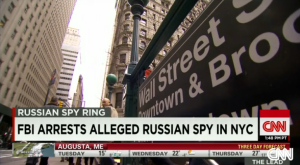Alleged covert agent
But the FBI was watching and listening to them. On Monday in New York, authorities arrested one of the men, who they say had been working as a covert agent for the Russian government. He was identified as Evgeny Buryakov, 39, who posed as an employee in the New York City office of a Russian bank, according to the federal complaint. The man he met regularly for the handoffs was Igor Sporyshev, 40, who worked as a trade representative for the Russian government in New York, the complaint says. A 27-year-old man serving as an attache to Russia’s mission at the United Nations, Victor Podobnyy, is also alleged to have been part of the conspiracy.
‘Extremely valuable intelligence asset’
All three men are accused of working for Russia’s foreign intelligence agency, the SVR. Sporyshev and Podobnyy, who no longer live in the United States and haven’t been arrested, both had diplomatic immunity because of their jobs for the Russian government. But Buryakov, who entered the United States as a private citizen, was operating under what officials called “non-official cover.”
Agents like that, known as “NOCs,” generally receive “less scrutiny by the host government, and, in many cases, are never identified as intelligence agents by the host government,” a statement from U.S. law enforcement authorities said. “As a result, a NOC is an extremely valuable intelligence asset for the SVR,” the statement said.
Attempts to recruit U.S. citizens
Buryakov needed the other two men to get mesages to and from the communications systems kept in the SVR’s office in New York, according to authorities. As he was undercover, he couldn’t go near the office. The subjects about which the men were tasked with gathering intelligence are believed to have included possible U.S. sanctions on Russia and U.S. efforts to develop alternative energy resources.
Sporyshev and Podobnyy also tried to recruit U.S. citizens as intelligence sources in New York, the complaint said. Their targets included people working for “major companies” and “young women with ties to a major university located in New York,” according to authorities.
‘I wouldn’t fly helicopters’
The FBI says in its complaint that its surveillance of the men heard them discussing various aspects of their work. In one conversation, Podobnyy is alleged to have talked about his technique for recruiting sources, which included “cheating, promising favors, and then discarding the intelligence source once the relevant information was obtained by the SVR,” according to authorities.
But in another discussion, he apparently complained to Sporyshev about how unexciting his everyday job was, saying it was “not even close” to James Bond movies. “Of course, I wouldn’t fly helicopters, but pretend to be somebody else at a minimum,” he said. Sporyshev seemed to concur, lamenting, “I also thought that at least I would go abroad with a different passport.”
Earlier spy ring busted
The two men also chatted about the 2010 unmasking of a Russian spy ring in the United States. In that case, 11 intelligence personnel, living and working in the U.S. as “sleeper” agents, were arrested and later allowed to return to Moscow as part of a spy swap. According to the complaint, Podobnyy suggested those agents “couldn’t do anything.”
“They studied some people, worked out some exits, but they didn’t get any materials,” he said. The FBI investigation into Buryakov, Sporyshev and Podobnyy began “within a few months” of the guilty pleas in the 2010 case, according to the FBI.

